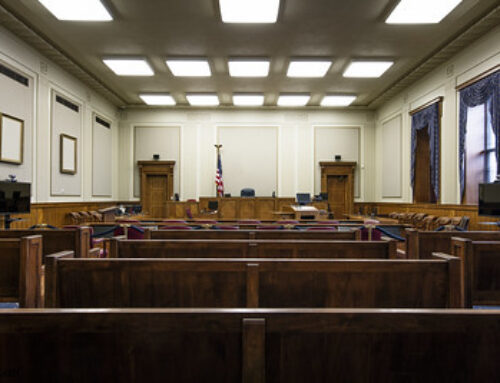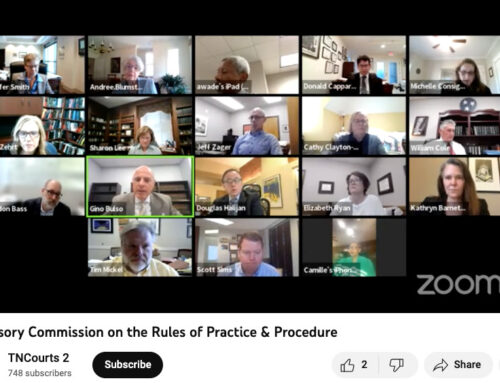The Tennessee Bar Association applauded the Tennessee Supreme Court’s initiative to update its rules on media coverage in courtrooms in comments filed Thursday, but suggested changes to the court’s proposal regarding usage of electronic devices like laptops and smartphones.
At issue are the court’s proposed changes to Tennessee Supreme Court Rule 30, enacted in 1996, that govern the use of cameras in the courtroom by media. In general, the rule outlines guidelines designed to avoid disruption or distraction during courtroom proceedings while upholding the openness of Tennessee courts and providing media a process to request use of camera equipment in advance.
In March, the Tennessee Supreme Court published proposed changes in the rule to address “changes in technology and modes of media coverage” and invited comment from the public. Later, it extended the comment period until Friday, Aug. 14.
In its comments, the Tennessee Bar Association suggested that the proposed language was overly broad and swept in uses of electronic devices that had become common tools of journalists and were routinely used in a courtroom by journalists, lawyers and even judges silently and without any distraction to anyone.
In addition to regulating “recording, broadcasting, transmitting, or webcasting,” the court’s proposal defined coverage subject to the rule as “media personnel’s posting on an internet website, communicating via social media, text messaging, or otherwise communicating via an electronic device about a court proceeding from inside the courtroom while court is in session.”
Many journalists were concerned that the language “would enact a new and unintended ban on the use of such devices for their ordinary work covering courtrooms, rather than merely regulating video and audio coverage of the courts,” the TBA said in its comments.
“Specifically, the Court’s proposed language could easily be interpreted to require that any journalist who wanted to use their smartphone, tablet, or laptop to take notes or draft a story about a trial or hearing they were attending, or email those notes or that draft story to their editor, would be required to get specific approval, two days in advance, in order to use many current electronic devices to do so. This would be true under the Court’s proposed revisions regardless of whether these uses of electronic devices were perfectly silent and non-distracting to others in the courtroom. In the TBA’s view, this type of requirement will often be unworkable as a practical matter… Indeed, some journalists have correctly pointed out that such a rule would unfairly – and perhaps unconstitutionally – discriminate between journalists based on whether they worked with a pencil and paper or a laptop.”
The TBA also noted that the use of the electronic devices by journalists “allows them to work more efficiently, while also most certainly increasing accuracy and quality of their reporting of courtroom proceedings.”
“The TBA believes that the Court’s valid interests in preserving decorum and good order in Tennessee courtrooms, and in fairly and thoroughly regulating the recording and transmission of video and audio of court proceedings, can be fully accomplished while more narrowly regulating the use of new technology.”
TBA submitted a draft of changes to the Supreme Court’s proposal, and included a preamble that affirmed the Court’s tradition of openness in Tennessee.
Read the TBA comments and draft: TBA Filed Rule 30 Comment.
The newly constituted Communication Law Section of the Tennessee Bar Association, chaired by attorney John Williams of Tune, Entrekin & White PC, worked on the TBA’s comments and draft changes. Lucian Pera with Adams and Reese LLP, vice president of the Tennessee Bar Association and a board member for the Tennessee Coalition for Open Government, was also involved.
Any organization, media entity or others are encouraged to submit its own comments on the proposal.
See more examples: Comments, including from Knoxville News Sentinel, on proposed Rule 30 changes filed with the Tennessee Supreme Court
You can submit comments online here: Submit comments on proposed rules.
Or mail written comments to:
James Hivner, Clerk
Re: Rule 30, Docket No. ADMIN2015-00451
100 Supreme Court Building
401 7th Avenue North
Nashville, TN 37219-1407




